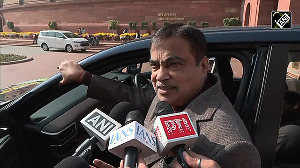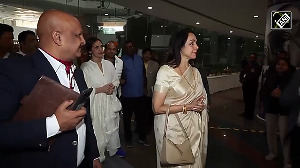'Hindu voters in coastal Karnataka lean more towards Hindutva than Hinduism which explains why the Siddaramaiah government's perception as anti-Hindu worked wonders for the BJP in coastal Karnataka.'
Rediff.com/Savera R Someshwar's MUST READ report.
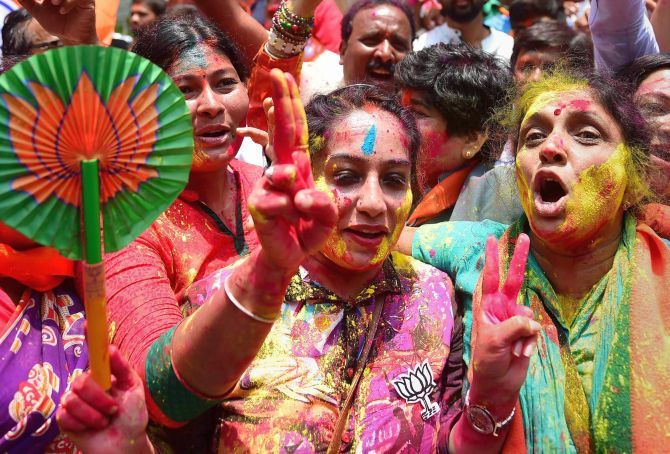
The emerald coastline of Karnataka seems like it is snoozing under the blazing summer sun, listening to the laps of the vast Arabian Sea, which at times touches a shore gently; at others, it tears into the land, in a roaring, furious power tussle reminiscent the recent election that gave the state two chief ministers in one week.
H D Kumaraswamy, who has occupied the chief ministerial chair for the second time, belongs to the Janata Dal-Secular, a party that won 37 seats in an election that saw 222 seats in the fray.
The JD-S is being supported by the Indian National Congress, which won 78 seats, down 44 seats from the 2013 election.
The party with the most number of seats, the Bharatiya Janata Party with 104, is, after a ignominious grab for power, seemingly resigning itself to occupy the Opposition benches... for the present at least.
Though the BJP may mourn its short-lived government in the state -- 75-year-old Bookanakere Siddalingappa Yeddyurappa broke his own record as a seven-day chief minister (November 12-19, 2007) to become a two-day chief minister (May 17-19, 2018) -- its silver lining continues to be its impressive performance in coastal Karnataka.
The BJP has swept 18 of the 21 seats that went to the polls on May 12 and set a record for itself by scoring four more seats than it did in the 2013 assembly elections.
Of the eight seats in the Dakshina Kannada district, the BJP won seven.
Of the six seats in the Uttara Kannada disctrict, the BJP won four.
In the Udupi district, which Prime Minister Narendra D Modi visited on May 1, the day he kickstarted his campaign in Karnataka, the BJP made a clean sweep of all five seats.
In the coffee district Kodagu, earlier known as Coorg, both Madikeri and Virajpet went to the BJP.
Various phrases have been used to describe this magnificent coastal stretch of Karnataka that has received bountiful gifts from Nature.
Yet, under its beautiful natural facade, a communal cauldron seethes.
This beautiful, sea-kissing belt of the state has, particularly in the last decade, seen increasing displays of communal intolerance and belligerence, murders and disruptions of law and order.
Politically, it has been christened a communal laboratory for the BJP to push through its foray into the south of India, where the lotus has only managed to successfully bloom once, in one state, Karnataka (2008-2013).
"If the BJP did well in coastal Karnataka," says Sudipto Mondal who cut his journalistic teeth covering coastal Karnataka, "it was because they took the gloves off and went straight for the vote."
Professor Rajaram Tolpadi, professor, department of political science, Mangalore University, and an avid watcher of Karnataka politics, expected "a significant advantage for the BJP" in coastal Karnataka, but finds himself surprised by the kind of "complete sweep" in the party's favour.
The BJP MLAs, who won these legislative seats for their party, say Siddaramaiah's "anti-Hindu stance" worked in their favour.
K Raghupathi Bhat, the BJP MLA from Udupi who won 52.31 per cent of the vote to defeat his sitting Congress adversary Pramod Madhwaraj, says, "The people have come to us because they believe the Siddaramaiah government is anti-Hindu."
"They were fed up with the anti-Hindu Congress government," adds first-time MLA Dr Y Bharath Shetty.
Principal of the A J Institute of Dental Sciences, Mangalore, Dr Shetty won the Mangalore North seat, trouncing the Congress' sitting MLA B A Mohiuddin Bava by 26,648 votes.
"The result," says the BJP's Umanantha A Kotian, "clearly shows there is no support for the Siddaramaiah government in coastal Karnataka."
Kotian, who lost the last election to K Abhayachandra of the Congress by 4,550 votes, beat his Congress adversary 29,799 votes to win the Moodabidri seat for the BJP for the first time in its electoral history.
Abhayachandra had represented Moodabidri for the last four terms.
Mondal agrees. "The fact that the Hindus saw Siddaramaiah as anti-Hindu worked against the Congress in a big way not just in coastal Karnataka, but across the rest of the state as well. His ham-handed approach antagonised people."
'No government has insulted Hindus as much as this government,' V Sunil Kumar, who won the Karkala seat for the BJP, raged to The Hindu.
'They celebrate Tipu Jayanthi by imposing prohibition orders in large parts of the state, they give aid to private Urdu schools while cutting aid to Hindu schools (referring to the government decision to discontinue funds to RSS leader K Prabhakar Bhat's school at Kalladka near Mangaluru) ... Hindus are angry.'
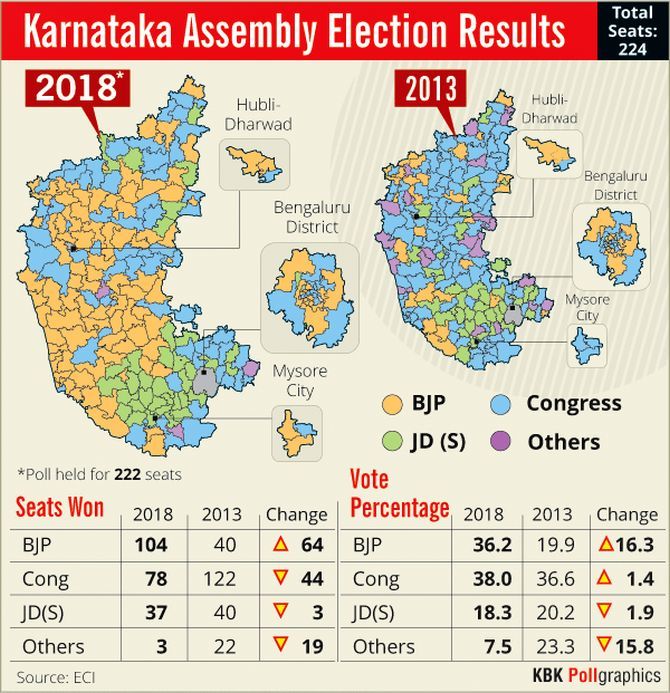
There were rumours -- later denied by Siddaramaiah -- that the Congress had entered into a secret alliance with the controversial Social Democratic Party Of India, the political face of the pro-Muslim Popular Front Of India.
The PFI faces multiple accusations of creating communal unrest, love jihad and religious conversions in Karnataka (particularly in coastal Karnataka), Kerala and Tamil Nadu.
"The BJP also stirred the pot with the pitch that 23 of 'our people', -- Hindus -- had been murdered (by Muslims) and nothing had been done about it," says Mondal.
This controversy started gaining traction in July last year when BJP MP Shobha Karandlaje, who represents Udupi-Chikmagalur, launched an offensive against Siddaramaiah's government in the countdown to the Karnataka assembly election.
In a letter to Union Home Minister Rajnath Singh, Karandlaje claimed that, since the year 2014, '23 BJP-RSS' activists were killed in Karnataka by 'jehadi elements'.
Most of these 'crimes' were supposed to have taken place in coastal Karnataka.
As the campaigning became more and more heated, this was one of the accusations was constantly, potently levelled at the state government.
U T Abdul Khader, minister for food and public distribution in the Siddaramaiah government, says he had to put in tremendous effort to ensure these rumours did not gain traction in his constituency.
"Our people worked very hard for four years and 11 months," he says. "All it took was one month of false allegations and rumours and false propaganda for them to get to the people and negate our hard work."
Karandlaje's list, says Mondal, "was fake".
One of those mentioned in Karandlaje's list was alive, 10 of the murders were caused by communal tensions and the local police, according to The Scroll, attributed the remaining deaths to personal and business rivalry.
'Later, when chief minister Siddaramaiah released data to show that adequate action has been taken in genuine cases and that a significant number of Muslims had been arrested in cases of political assaults,' The Scroll report adds, 'it became clear that the allegations of bias that the BJP made against the state government had little merit.'
"But the problem," says Mondal, "is that the prime minister came here and parroted the same number and endorsed that claim."
So did another key campaigner, Uttar Pradesh Chief Minister Ajay Singh Bisht.
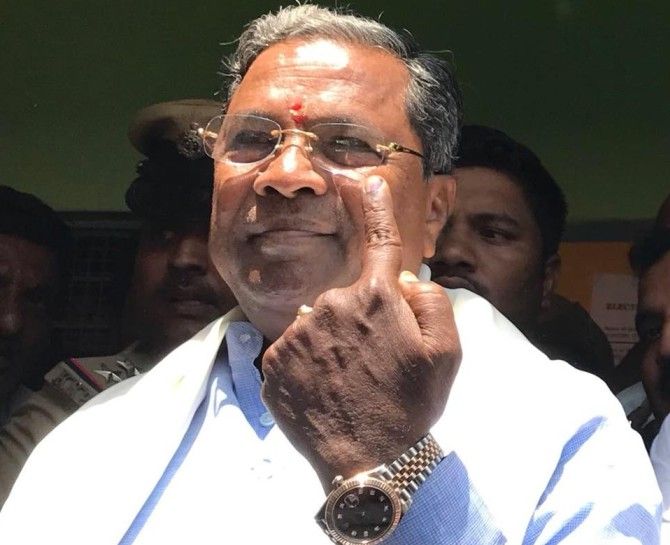
"There was an anti-Siddaramaiah -- not an anti-Congress -- wave in this election; people have shown a very personal kind of enmity against Siddaramaiah," points out Tolpadi.
"His own party worked against him," says Mondal of the first chief minister to complete a five year term in the state in 40 years.
"The Congress is essentially a Hindu party and Siddaramaiah is anti-Hindu in that he wants to break the hegemony of caste. He is not willing to bow to Udupi's powerful Sri Krishna Matha, with whom he has had an ongoing feud for over 12 years," adds Mondal.
When President Pranab Mukherjee visited the matha in 2017, Siddaramaiah did not accompany him.
Bhat, who won Udupi for the BJP, says, "Siddaramaiah came to Udupi six times, but purposely did not visit the Sri Krishna Matha. This hurt the Hindus."
Siddaramaiah also angered devotees of Dharmasthala, another powerful temple in Dakshina Kannada.
Media reports alleged the chief minister had visited the temple after eating fish.
"When he was asked, 'Did you go to the temple after eating fish?' he answered, 'I went after eating chicken also,' Bhat says.
"As chief minister, should he not respect everybody's sentiments? If media reports said he had eaten fish before going to Dharmasthala, he could have humbly apologised, said he made a mistake and would beg God's forgiveness," adds Bhat. "Then, it would have blown over instead of becoming such a big issue."
Tolpadi believes Siddaramaiah's arrogant stance led to his downfall.
"I am not ideologically against it (eating non-vegetarian food before going to a temple), but there are certain kinds of statements you don't expect from a chief minister," Tolpadi says.
"Many Hindus, irrespective of whether they were supporting the BJP or the Congress or any other party, would have been hurt by it. His body language too worked against him."
Bhat, who also refers to Siddaramaiah's hubristic body language, adds, "Nobody had to convince the people that Siddaramaiah's was an anti-Hindu government. They realised it themselves by following the news and hearing his statements."
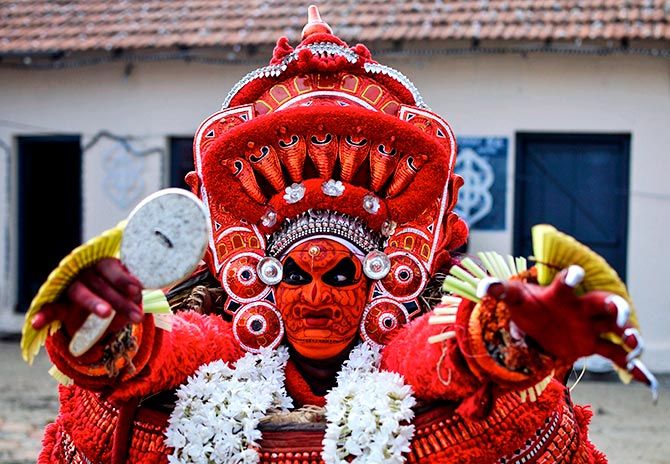
Siddaramaiah's insistence at passing the anti-superstition bill too may have worked against him in coastal Karnataka.
The Karnataka Prevention And Eradication Of Inhuman Practices Black Magic Bill, was passed in 2017.
Though a watered down version of the original bill that was presented in 2016 -- the only cabinet member, other than Siddaramaiah, to support it was then law and parliamentary affairs minister T B Jayachandra -- it caused much consternation among the state's politicians, including those in the Congress.
Among other things, the revised bill bans 'madde snana' (a practice where people belonging to the lower castes rolled over the food that was left over after the Brahmins finished eating; this generally took place at a temple and the food was served to the Brahmins on plantain leaves. According to Wikipedia, the practice, which is said to be more than 500 years old, is believed to rid one of one's bad karma, skin ailments, etc).
Until its ban last year, this ritual was religiously practised at the influential Kukke Sri Subrahmanya Temple in Dakshina Kannada district.
The bill caused such misgivings among the state's politicians that Kumaraswamy's elder brother H D Revanna -- also a JD-S leader-- suggested the Congress consider postponing it until after the 2018 assembly election as it could harm the Congress' prospects at the polls.
The bill also targeted certain aspects of spirit worship, such as performances claiming possession of a higher power, gaavu (killing an animal by biting its neck) and animal sacrifice.
"Coastal Karnataka," explains Mondal, "is one of the cradles of the anti-Hindu tradition in India. Counter-Vedic culture has prevailed in the west coast of India, starting from the southern part of Goa all the way to Kerala since many, many centuries. Even today, you have the practice of spirit worship in the form of Theyyam and Bhuta Kolas and Nemas."
Bhuta Kola is not limited to Hindus, it is practised by some in the Muslim community as well.
Spirit worship, as practised here, has both secular and religious overtones.
Bhuta Kolas and Nemas simultaneously serve as courts of justices where real-life problems are presented and the solution given by the spirit accepted without argument.
The spirit, also called a Daieva, is thanked with presents/money for watching over the family, the land and/or the village.
"The bhuta worship has nothing to do with Hindu culture," says Mondal. It is animistic and "does not recognise any Hindu symbols. There is meat eating, there is drinking, there is animal sacrifice."
Post-Independence, he says, these communities were brought under the Hindu umbrella for administrative reasons but spirit worship continues to be a big part of the social fabric of coastal Karnataka, particularly in the rural areas.
At the same time, coastal Karnataka is a bastion of the Hindu faith, says Mondal. "It has the Ashtamathas of Udupi, the eight most important religious mathas in the country."
There is another reason, say Tolpadi, why coastal Karnataka walks to a different beat as compared to the rest of the state.
"Historically," explains Tolpadi, "coastal Karnataka is very different from the rest of the state in terms of social chemistry, class and caste composition and the historical foundation of the region; it is not actually part of Karnataka in the strict sense of the term. Administratively as well, for a long period, it was part of the Madras Presidency."
"The kind of modernisation, the trajectory of modernisation, industrialisation and urbanisation that has taken place in this region is very different from other parts of Karnataka. It is a very specific kind of capitalist development and this specific kind of capitalist development coexists with all kinds of communal ideologies, whether of the Hindu variety of the minority variety," Tolpadi adds.
Today, among others things, coastal Karnataka is known for its many educational institutions. In fact, the BJP MLA for Mangalore North, Dr Bharath Shetty, is the principal of the A J Institute of Dental Science in the city.
"The education here," says Tolpadi, "is professional and business-oriented. Courses like medicine, engineering, management and business are popular here. Coastal Karnataka does not have a tradition of very serious or critical humanistic education. Job-oriented, job-fetching education is popular here."
At the same time, he points out, "Education is mostly communally constituted here. Most dominant castes and religions have their own institutions and certain kinds of ideas are spread there. There are colleges for Billavas, for Bunts, for Christians, for Brahmins, for Muslims. Education too is being used to purvey communalism."
The kind of education, this kind of literacy, says Mondal, means that you have a voter who "wants to have a handle on power. They take strategic decisions. If you can't form the government in Bengaluru, they will not support you. This time, it looked like the BJP was in touching distance of power..."
Also, say both, Hindu voters in coastal Karnataka lean more towards Hindutva than Hinduism which explains why the Siddaramaiah government's perception as anti-Hindu worked wonders for the BJP in coastal Karnataka.
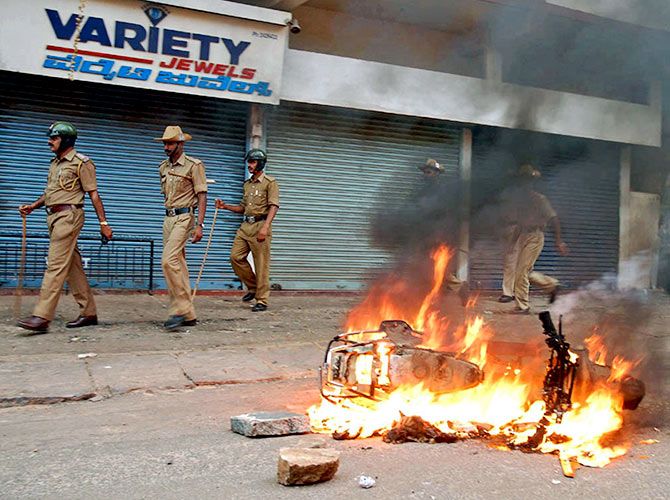
"Coastal Karnataka is very regressive," says Mondal. "Unlike north and south Karnataka, the people here are not recent converts to Hindutva; they are second or third generation Hindutva supporters. I would even go as far as to say, what Nagpur is to the Dalits, coastal Karnataka is to Hindutva supporters. At the same time, the people here -- across communities -- are business-minded and don't want their bottomline affected."
"Over the five decades," explains Tolpadi, who used to be part of the Sangh Parivar at one time, "there has been a systematic consolidation of communalism in this place. It began with the anti-Emergency movement led by the Sangh Parivar in the 1970s. It allowed them to get into communities, the student community in particular."
"As a result," he adds, "the AVBP became very strong in the 1980s and the 1990s. It also explains the tremendous expansion of Sangh shakhas during this period. Slowly, the communal perspective began to spread among the people."
Over time, the Sangh Parivar became part of people's lives though "civil society activities" like the "bhajana mandalas and youth clubs" and now is part of the social fabric of the area.
Mondal is more blunt in his view.
"In coastal Karnataka today, everybody has had to bow to the will of the RSS. Even the Congress," he says.
"When the Congress swept the state in the last election, it was the RSS way of teaching the BJP a lesson. The coastal Karnataka belt wanted hardcore Hindutva which Yeddyurappa could not provide," Mondal adds.
Siddaramaiah's AHINDA platform could have been a powerful counter to Hindutva, says Mondal. "The Congress did not support it and thus destroyed its potency."
AHINDA is Siddaramaiah's attempt to bring together the minorities (Alpasankhyataru), the backward castes (Hindulidavaru) and the Dalits (Dalitaru) as a powerful third alternative to the two castes that dominate Karnataka's political state today -- the Vokkaligas and the Lingayats.
He also granted the Lingayats' long-standing demand minority status, but the move backfired, with the Veerashaivas objecting to the government's decision to grant this status only to those who followed the teachings of the 12th century philosopher, Basavanna.
Though the Lingayat community does not dominate coastal Karnataka, this was seen as yet another anti-Hindu move by a government that was perceived as pro-Muslim.
Umanantha Kotian, who opened the BJP's account in Moodabidri, says, "The people of coastal Karnataka are not fools. They are fed up with the utter appeasement of the minorities by the Siddaramaiah government."
What also helped the BJP in coastal Karnataka is that there has a visible spurt in wealth among the three major communities in coastal Karnataka -- Hindus, Muslims and Catholics.
"The money started coming in," says Mondal, "because people went abroad to earn it. As a result, the prevention of economic growth of a people, which is one of the pillars of communalism, crumbled, especially as far as the Muslims are concerned.
"One thing I've noticed is among the Muslims here, much like the Africans, is that they use a lot of bling. And they use the money they have earned from the Gulf to build big, brightly coloured houses. That is a way of asserting that I may not be able to do business here -- for example, Muslims find it difficult to do business in Mangalore while Catholics do very well -- but I am still very much here," explains Mondal.
This visibility has been used fan communal insecurity.
"It was the Congress," says Mondal, "that created the ground that virulent Hindutva needed to flourish. For the longest time, it was enough for the Hindu voter here that the Congress was a Hindu party and supported Hindutva," Mondal says.
"Then the Congress started turning secular due to national pressures. It was the demolition of the Babri Masjid that forced the Congress to take a stand and state that they were not anti-Muslim."
"We support Hindus, there is no question about that," says BJP MLA Dr Shetty, "but that does not mean we are not anti-Muslim or anti-Christian. The real meaning of secularism is to be fair, isn't it?"
"But when you take one side and, most of the time, Hindus are at the receiving end, then obviously, we will have to come to their support," adds Dr Shetty. "It does not mean we are anti-Hindu or anti-Muslim or anti-Christian; that's a wrong perception that has been built up the Congress and its bandwagon."
The tinderbox that is coastal Karnataka is the result, says Tolpadi, "of greedy political parties, ideological interventions, historical development and the manner in which community and caste identities are constituted and constructed."
Communal cleavages, he adds, have always existed in coastal Karnataka.
"But they were not very acute. Coastal Karnataka has always been a deeply divided society," Tolpadi points out.
"Communal problems are going to continue, communal consolidation is going to take place, communal mobilisation will be continued as part of the political process unless some very serious ideological intervention takes place. But I don't see where it will come from because there are no symptoms of any kind of social movement emerging from this place."








